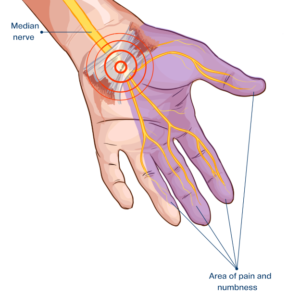Office workers, laborers, and anyone who performs repetitive motion tasks throughout the day can develop carpal tunnel syndrome. This condition interferes with hand functions, causing pain, weakness, and limited motion.
What Is Carpal Tunnel Syndrome?
There is a median nerve that runs along a narrow passageway (called the carpal tunnel) to the palm side of the hand. When there is pressure on that nerve, it blocks or slows the nerve impulses that travel through the hand. This results in the tingling, pain and weakness associated with carpal tunnel syndrome.
Those who perform repetitive tasks such as typing or working on an assembly line are particularly vulnerable to this problem.
What Causes Carpal Tunnel
Carpal tunnel syndrome develops when excessive pressure is placed on the median nerve and inflames the surrounding tissue.
Other causes of carpal tunnel are:
Repetitive motion – Typing, working on an assembly line, or use of hand tools.
Underlying health conditions – These include diabetes, rheumatoid arthritis and thyroid issues.
Pregnancy – Sometimes the hormonal changes that occur during pregnancy can cause swollen wrists.
Carpal Tunnel Syndrome Symptoms
Pain and weakness are two of the most common carpal tunnel symptoms. Others include:
- Tingling and numbness, usually on the middle, ring, index fingers, and thumb.
- A sensation like an electric shock
- Difficulty holding objects
Carpal Tunnel Syndrome Treatments
There are cases where carpal tunnel syndrome is caused by other, underlying medical conditions. These may include:
- Hypothyroidism
- Rheumatoid arthritis
- Tendonitis
- Other issues involving the nerves
Before creating a comprehensive treatment plan, the underlying condition should be treated first.
We offer several effective and minimally invasive treatments for carpal tunnel. The approach we take depends upon your situation, including the severity of your condition.
These treatment techniques include:
Medication
Anti-inflammatory drugs and pain relievers like acetaminophen are often effective at providing relief from carpal tunnel pain.
Splinting
When treating carpal tunnel, it’s important to keep the wrist straight when you sleep. This can be a challenge for those who like to sleep on their side or those who “toss and turn” during the night.
This is why we often recommend splinting the affected wrist at night. By alleviating the pressure on the median nerve, you can find relief and prevent the problem from getting worse. We can help you find the type of splint you need.
Wrist Injections
In case these more conservative methods have not been effective, a cortisone injection into the carpal tunnel can provide relief—often for weeks or months.
Carpal Tunnel Surgery
We only consider surgery if more conservative treatments have not been successful. Carpal tunnel surgery consists of a technique called carpal tunnel release.
Through this procedure, we make a small incision near your wrist and cut the ligament covering your carpal tunnel. This helps relieve pressure on the median nerve. Most patients can have the surgery done as an outpatient.
Carpal Tunnel Syndrome Test
To determine an accurate diagnosis of this condition, we conduct various carpal tunnel syndrome tests. These include:
- A physical examination, where we’ll check for muscle weakness around your thumb.
- Nerve conduction studies, where we measure the electrical impulses in the medial nerve.
- Electromyogram (EMG), a type of test that evaluates muscles controlled by the median nerve.
- In certain cases, ultrasounds or MRIs are used to make a diagnosis.
The results not only confirm a diagnosis but also provide valuable information on how to best treat your individual situation.
Carpal Tunnel Exercises
There are exercises for carpal tunnel that can bring relief to the symptoms. Some of these exercises include:
- Wrist flexing and extension, where you gently bend your wrists backward and forward.
- Median nerve glides, where you stretch out the arm, gently bend back the wrist and wiggle the fingers.
- Tendon glides, where you start with straight fingers, then bend the middle joints down toward the upper palm.
Don’t Let the Symptoms of Carpal Tunnel Syndrome Hold You Back Any Longer
In its extreme forms, carpal tunnel syndrome can make it difficult or even impossible to perform activities necessary for working or daily living. Our experienced rheumatologist and healthcare team provide personalized care and advanced treatments.
With a supportive and welcoming environment, see how our carpal tunnel treatment in Raleigh is conducted by our leading rheumatologist. We’re here to help you retain your mobility and improve your quality of life. Contact us for an appointment.



